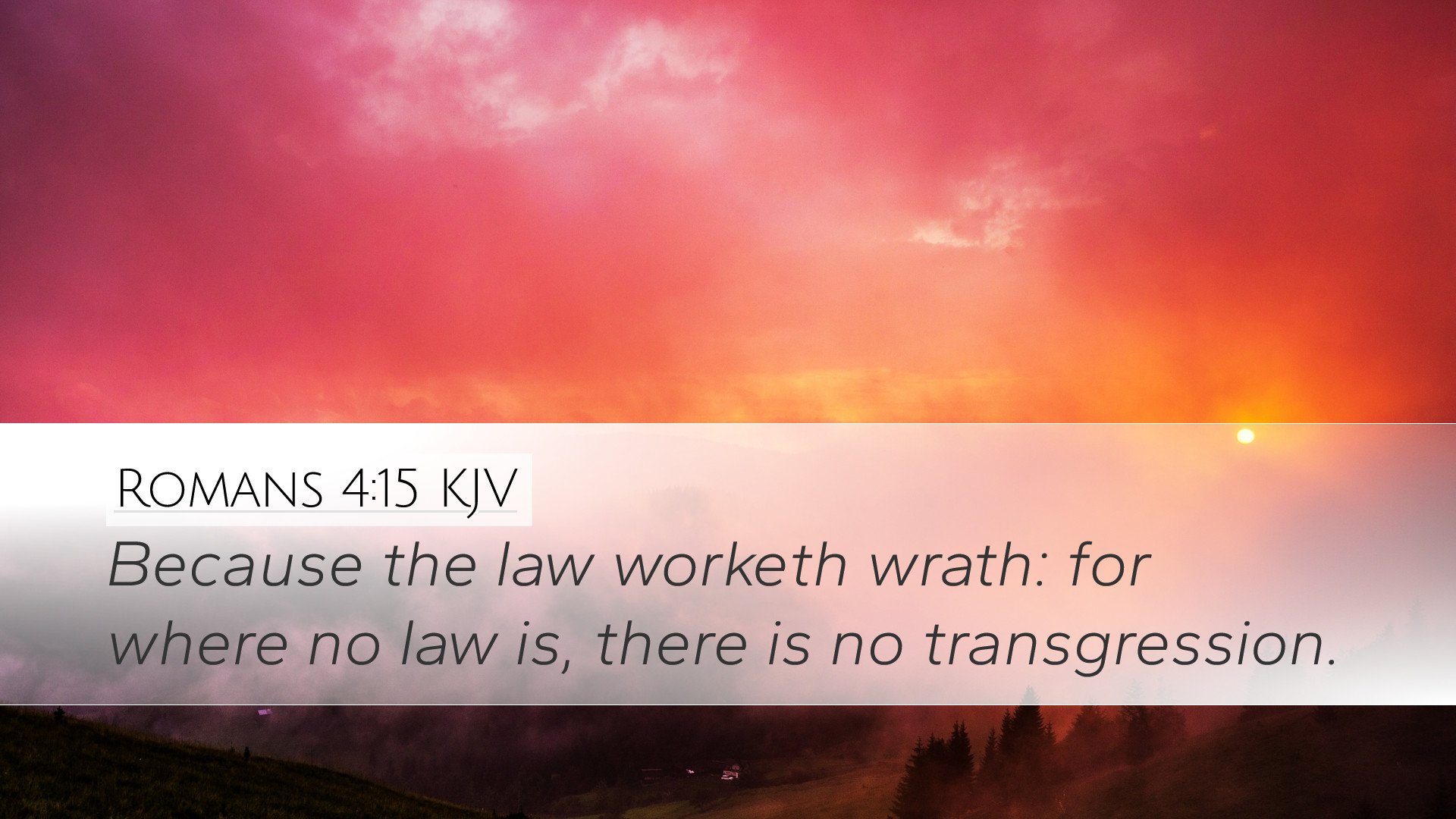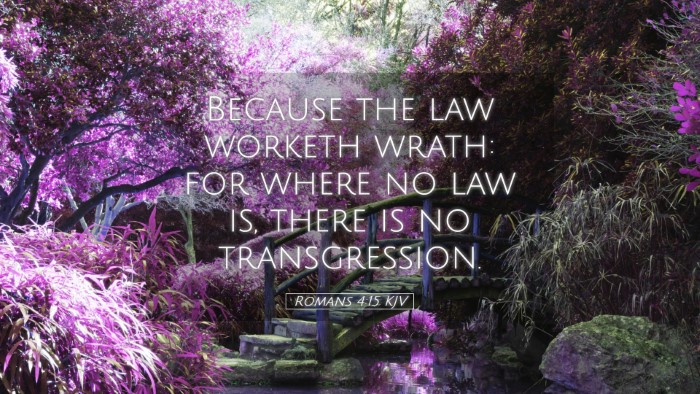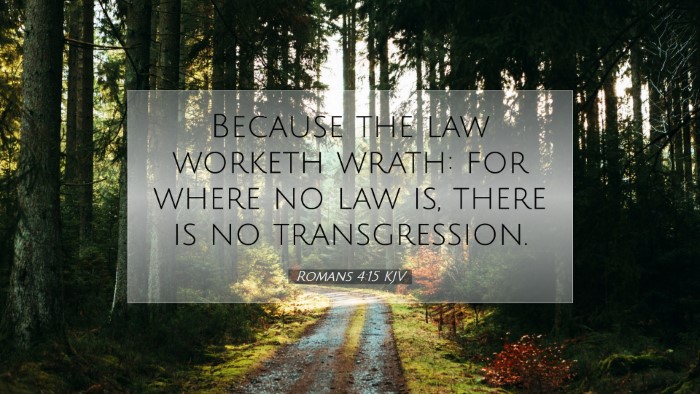Old Testament
Genesis Exodus Leviticus Numbers Deuteronomy Joshua Judges Ruth 1 Samuel 2 Samuel 1 Kings 2 Kings 1 Chronicles 2 Chronicles Ezra Nehemiah Esther Job Psalms Proverbs Ecclesiastes Song of Solomon Isaiah Jeremiah Lamentations Ezekiel Daniel Hosea Joel Amos Obadiah Jonah Micah Nahum Habakkuk Zephaniah Haggai Zechariah MalachiRomans 4:15
Romans 4:15 KJV
Because the law worketh wrath: for where no law is, there is no transgression.
Romans 4:15 Bible Commentary
Bible Commentary on Romans 4:15
Verse: Romans 4:15 - "Because the law worketh wrath: for where no law is, there is no transgression."
Introduction
Romans 4:15 is a critical text within the theological discourse of the Apostle Paul. It draws attention to the nature of the law and its relationship with sin and grace. This commentary synthesizes insights from various public domain sources, aiming to provide a comprehensive understanding of Paul's argument regarding the law's limitations and the broader implications for salvation.
Theological Implications of the Law
Matthew Henry underscores that the law, while holy and just, serves to reveal human sinfulness. He notes that the introduction of law brings about a consciousness of transgression, thereby awakening wrath both in God and within the sinner. Without the law, there is no definition of sin; thus, transgression cannot occur in the absence of a commandment.
Albert Barnes further elucidates this point by explaining that the law's primary function is to demonstrate humanity's shortcomings before a holy God. He states that the law acts as a mirror, reflecting the moral state of mankind and provoking divine wrath due to the violation of its precepts. Thus, its presence amplifies the sense of guilt and accountability.
Adam Clarke elaborates on the historical context, arguing that the Jewish people, who relied heavily on the law as a means of righteousness, failed to recognize its limitations. Clarke asserts that the law was meant to lead to Christ, yet many remained in spiritual blindness, clinging to their legalistic observance rather than embracing the grace offered through faith.
Understanding Transgression
The declaration that "where there is no law, there is no transgression" introduces a profound insight into the concept of sin. Matthew Henry suggests that this does not imply a lack of moral culpability but rather the absence of the specific legal framework that defines and condemns sin. In essence, transgression exists when known commandments are breached.
Albert Barnes posits that this statement reflects God's fairness in His judgment; without a clear standard, individuals cannot be held responsible for violations they do not comprehend. Barnes draws on this to argue for the necessity of revelation, explaining that God, in His mercy, has provided the law to illustrate the nature of sin and the need for repentance.
Adam Clarke further comments on the nature of transgression across history, observing that before the law was given, sin existed in the hearts of individuals, but it was not accounted in the same manner as after the law was codified. The law's introduction is thus seen as a pivotal moment that rendered humanity aware of sin’s gravity and the urgency for salvation.
Grace vs. Law
The juxtaposition of grace and law is a central theme in Romans, and in 4:15, Paul emphasizes grace as the antidote to the wrath that law provokes. Matthew Henry captures this dichotomy beautifully, noting that while the law incites wrath, it also sets the stage for the grace that comes through faith in Christ. He points out that the transgressor, upon understanding the severity of sin, is often led to seek the grace that is available through the sacrifice of Jesus.
Albert Barnes interprets this contrast as one that highlights the necessity of faith for justification. He elaborates that justification cannot arise from law observance but rather from the grace of God imparted through faith. This revelation frees believers from the condemnation of the law and opens the path to eternal life.
Adam Clarke emphasizes the transformative power of grace, suggesting that it not only forgives but also empowers believers to live righteously. Clarke asserts that the true purpose of the law is to lead individuals to recognize their need for grace, at which point they can experience true liberation from the cycle of guilt and condemnation.
Application for Believers
In light of Romans 4:15, believers today are invited to reflect upon their relationship with the law and the saving grace of Jesus Christ. Matthew Henry encourages Christians to remain aware of their sinfulness and the unmerited favor they receive through faith, urging them to respond in gratitude and obedience to God's commandments.
Albert Barnes challenges readers to consider the implications of living under grace rather than under the law. He urges individuals to embrace their identity as recipients of grace, which should reflect in their actions and attitudes toward others, fostering a spirit of love and service rather than legalistic judgment.
Adam Clarke calls believers to a deeper commitment to understanding the law in light of grace. He suggests that while the law should not be the source of their righteousness, it remains a vital tool for spiritual growth and moral guidance, serving as a framework within which they live out their faith.
Conclusion
Romans 4:15 encapsulates a foundational truth of the Christian faith: the relationship between law, sin, and grace. Drawing from the insights of Matthew Henry, Albert Barnes, and Adam Clarke, this commentary emphasizes that while the law exposes transgression and invokes wrath, it also propels believers toward the grace of God found in Christ. As pastors, students, and theologians reflect on this verse, they are reminded of the profound depth of God's mercy and the transformative power of faith.


